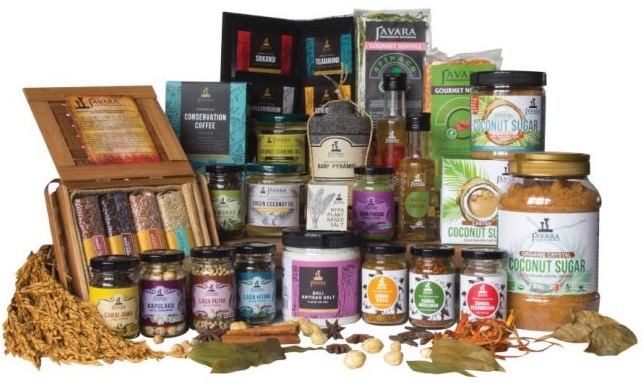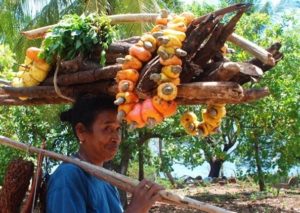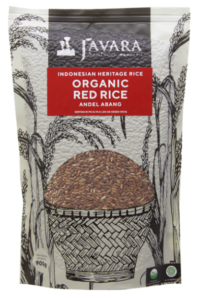Based in Indonesia, the company Javara and its 50,000 farmer-entrepreneurs produce locally and sell on four continents, from Asia to North America. Their products include sustainably grown fruits, nuts, rice, superfoods, oils, condiments and more. Customers include supermarkets, restaurants, hotel chains such as Grand Hyatt, and end consumers through Javara’s own store and cafe in the city of Jakarta. This social and commercial success opened its doors in 2008, with its founder inspired by community values and a desire to help conserve her country’s traditional foods, indigenous wisdom, and biodiversity.
In contrast to many common notions of big agriculture and large-scale food processing, or perceived limits of smallholder and ecological farming, Javara excels through thousands of local partnerships across the country. This is no small feat given Indonesia’s diverse and vast territory, but the business model has proven remarkably successful when aligned around community values. It is designed specifically to work with smallholder farm networks and artisanal food processors. It has been profitable and growing for more than a decade, while upholding 100 percent of production in land-friendly, health-friendly, and culture-friendly ways.
profitable and growing for more than a decade, while upholding 100 percent of production in land-friendly, health-friendly, and culture-friendly ways.
The Roots of JAVARA’s Success
Several critical factors contribute. At the core, many Indonesian farmers practice traditional methods, which in large part means they don’t use chemical fertilizers and pesticides in ways that damage soil health and biodiversity. In fact, Indonesia retained its rich history of organic farming while others were adopting what they perceived as “modern” commercial agricultural practices in the Green Revolution of the 1960s and 1970s. The result is generations of Indonesians whose culture and livelihoods involve working the land. This foundation of organic farming skills, when nurtured with Javara’s technical assistance in regenerative land management practices and identification of traditional ingredients and organizing and marketing, has brought forgotten foods into the mainstream and built commercial markets for their rich flavors and traditions.

Important to Javara’s success is a focus on supporting farmers not just as producers but as creative entrepreneurs. This principle is modeled by Javara’s founder, Ms. Helianti Hilman, a cook and a lawyer who started the entire enterprise in this way with her own mother’s urging. Javara selects and works hand-in-hand with its local farmer-entrepreneurs throughout their production process – from engaging them in the discovery of foods with high market potential, to providing financial assistance, training in technology and marketing, and support for organizing into local collectives.
Javara simultaneously works with and trains local food artisans to identify, create, and produce high quality, great tasting products. These artisans then source their food from the farmer collectives, process it, and sell to Javara for centralized marketing and distribution. In this way, traditional smallholder farmers and local food producers are the essential bio-cultural-economic value-adding source for Javara’s products.
Beyond Products on Shelves: Storytelling
Essential to Javara’s model is storytelling – bringing food products to life for consumers, in Indonesia and Globally. To this end, the food’s packaging tells you its origin in history, how it is grown and produced, its nutritional benefits, culinary ideas, and a dose of indigenous wisdom. When in the city of Jakarta, you can even experience all of this first-hand at the JAVARA cafe and store. While there you can taste the foods, talk to farmers, meet chefs who helped create the food products, take cooking classes, and learn more about the biodiversity, indigenous wisdom and culinary tradition of these products.
 Example: Andel Abang Red Rice is popular in the Yogyakarta and Central Java regions of Indonesia. It originated with Admiral Cheng Ho in the 14th century, is cultivated three times per year, and contains selenium which helps fight free radicals that damage cell membranes in your body, thus helping prevent degenerative illnesses while also lowering blood sugar.
Example: Andel Abang Red Rice is popular in the Yogyakarta and Central Java regions of Indonesia. It originated with Admiral Cheng Ho in the 14th century, is cultivated three times per year, and contains selenium which helps fight free radicals that damage cell membranes in your body, thus helping prevent degenerative illnesses while also lowering blood sugar.
Javara began with one founder who cares immensely about her community, ten farmers, and eight products. It now includes 85 employees, 50,000 local farmers, 3,000 local food artisans, and 600 products sold around the globe. Traditional Indonesian farmers and artisans and Javara’s business managers confront challenges together and prosper with culture, economy, food security, nutrition and biodiversity – and consumers are becoming more connected to their food through taste and stories.
Photo Credits: Javara

These additional details about Javara might be useful for other bio-cultural-economic nourishment-cycle enterprisers to consider:
– Javara’s founder Ms. Helianti Hilman recognized that even though Indonesian farmers lived in different corners of the country, they shared similar local wisdom and principles surrounding farming.
– Javara started as a foundation to assist small farmers, then shifted to an enterprise approach to help attract potential investors.
– Javara prizes food security and sovereignty for communities above profit, and in doing so, is running a very successful business. For example, Javara does not purchase from farmers who want to sell their entire crop for profit rather than retaining portions for local food supply.
– Javara’s financing for various programs has come from combinations of product sales, impact investors, grants, government programs, and local and international non-governmental organizations. Javara’s partnership with banks for global financial management has also helped build their reputation in the finance sector.
– Javara carefully selects which farmers to work with. Javara works primarily with farmers (now numbering over 50,000) who maintain the heritage of biodiversity in foods. Together they taste ingredients and test soils, and they manage risks by calculating specific needs for land, seed or seedlings, and estimated size of the harvest.
– In areas where traditional farmers are aging, Javara’s programs, including training for young people on sustainable farming and developing traditional products with high market potential.
– Javara’s finances are completely transparent with the farmers: together, they calculate crop pricing, costs, and margins, and they share in any surpluses.
– Javara assists farmers with organic certification and financing for equipment purchases.
– Javara’s programs to allow each farmer to become an entrepreneur includes exposure to all aspects of the production, selling, packaging, and marketing successes.
– Javara works with local and international citizen-sector or non-government organizations (NGOs) who provide some facilitation and partnership services.
– As part of product development, Javara also conducts market research internationally to identify opportunities and price data for particular products it might develop with its farmers.
– All Javara products are origin-specific and traceable based on their sourcing and the story of their heritage.
References:
https://javara.co.id/
https://www.thejakartapost.com/news/2014/07/31/discovering-indonesia-s-indigenous-food-products.html
https://www.theguardian.com/sustainable-business/2015/jun/24/beyond-organic-promoting-indonesias-indigenous-farming-cultures
https://the-inkline.com/2018/07/05/javara-keeping-indigenous-food-and-culture-alive-in-indonesia/
https://www.mmtimes.com/opinion/25533-social-finance-taps-funding-so-all-benefit.html